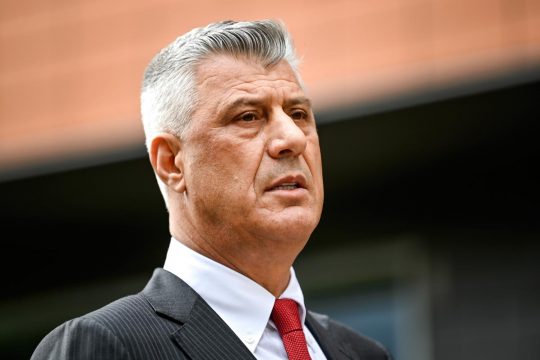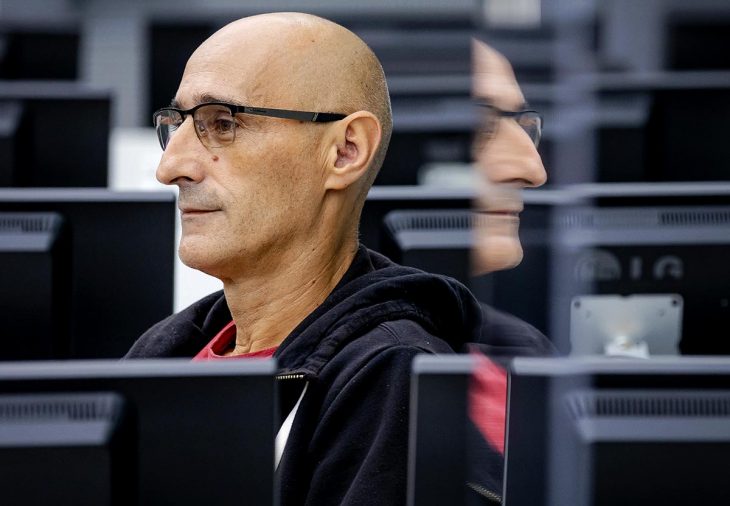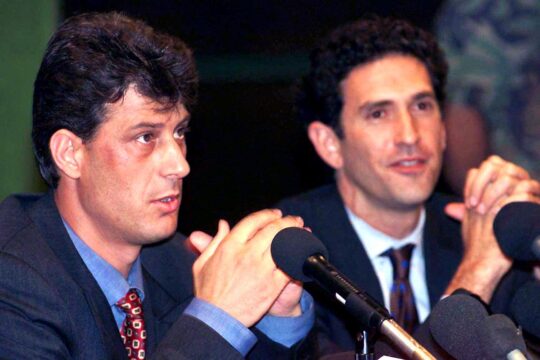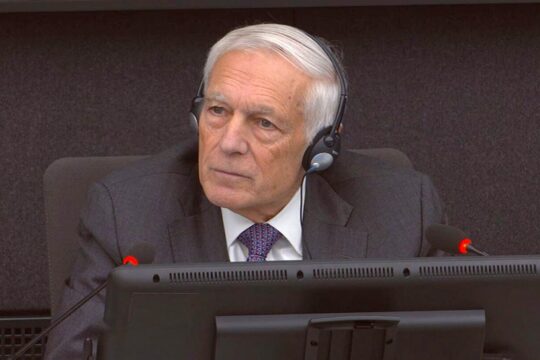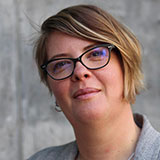Former KLA commander Salih Mustafa, 50, made his disdain for the court clear when he was asked if he wanted to change his earlier ‘not guilty’ plea. "I am not guilty of any of the counts brought here before me by this Gestapo office," he told judges.
Mustafa, dressed in a red and black tracksuit, occasionally glared at prosecutors and fidgeted with a pen. He faces four charges of war crimes for arbitrary detention, cruel treatment, torture and murder in the first Kosovo Specialist Chambers (KSC) case to go to trial, opened on September 15 in The Hague, Netherlands.
In the spring of 1999, Mustafa ran a Kosovo Liberation Army (KLA) prison facility where, according to the prosecution, inmates were tortured and beaten.
KSC’s difficult beginnings
The KSC was established in 2015. Its creation was a direct result of a 2011 report by Council of Europe rapporteur Dick Marty which tied top former KLA officials, including the former president of Kosovo Hashim Thaci, to atrocities committed against Serbs and others during and in the aftermath of the 1998-1999 conflict in Kosovo.
While such crimes fell under the remit of the International Criminal Tribunal for the former Yugoslavia (ICTY), that institution was winding down and was no longer opening new cases. Under pressure from the U.S. and the European Union, Pristina grudgingly agreed to set up a new court, embedded in Kosovo law but entirely staffed by international judges and prosecutors and seated in The Hague.
The court is regarded with suspicion by many Kosovo Albanians who praise the KLA fighters for getting independence from Serbia. The court’s most high-profile suspect is former president Thaci, who turned himself in last year to face charges of war crimes and crimes against humanity.
War crimes do not justify war crimes
In his first opening statement, the Specialist Prosecutor, Jack Smith, specifically called out people who accuse the Kosovo tribunal of being anti-KLA. “Nothing is further from the truth,” the US prosecutor said, adding that the court was looking to individual criminal responsibility of suspects.
“The charges against the accused in [Mustafa’s] case concerns his individual involvement in the detention, mistreatment and torture of Kosovar people. The trial of this case concerns the personal responsibility of the accused, mister Mustafa, whose acts have caused suffering that left indelible wounds in the bodies and the minds of victims who suffered through it,” Smith said.
He dismissed “the often-used tactic” of pointing to crimes committed by the Serbs, that continue to go unpunished. “As a prosecutor, it is beyond my remit to argue to you or decide what war is just or what war was not, but I can say with conviction that war crimes on one side do not justify war crimes on the other sides,” Smith said.
He added that the work of the prosecutor was especially difficult because of the continuing climate of intimidation of witnesses who speak out against the KLA.
“Victims of the KLA live in fear”
The prosecution tried to make clear that this trial would focus on Mustafa and would not seek to condemn all of the KLA members or their fight for freedom. According to the indictment, Mustafa personally took part in some of the beatings and torture of at least six prisoners and was present when another detainee was abused, and later died.
“He slept in same house where the prisoners were kept. Screams of pain during the interrogation and beatings-- which generally took place on the upper floor where the accused normally stayed-- were so loud that they could be heard from the other prisoners one floor below,” prosecutor Cezary Michalczuk said.
Mustafa, after a break in the hearing, did not return to court to hear the opening statement of lawyers for the victims, telling his lawyer he no longer wanted to attend. The judges allowed his temporary absence as he was represented by a lawyer. However, they warned Mustafa through his lawyer that they could compel him to attend his trial.
So far nine persons have been allowed to participate in the case as victims but other can still apply to join. Victims’ representative Anni Pues, slammed Mustafa saying his departure showed a clear disregard for the victims. She added that she hoped this case could help change the narrative about the war in Kosovo and the KLA’s role. “Victims of the KLA have to live in fear and face apathy against them,” she told the court.
While victims of war crimes by the forces of former president Slobodan Milosevic are encouraged to come forward and seek justice, victims of KLA fighters are “gaslighted and accused of harming the reputation of the KLA”, she said. According to Pues, victims of the KLA cannot even get an official recognition as war victims and receive any government aid as the Kosovo law on “war martyrs, invalids and heroes” identifies victims only as former KLA members or civilians who were detained, tortured, killed or wounded by enemy forces.
“Political statements”
On Kosovo’s Kohavision TV, commentator Ehat Miftaraj of the Kosovo Law Institute slammed Pues for what he called "veering into political statements" and said she seemed "unaware of the political context of the 98-99 conflict". More than 13,000 people are estimated to have died during the 1998-1999 war in Kosovo, when the southern province was still part of Serbia under the Milosevic’s rule. Fighting ended after NATO air strikes against Milosevic's forces.
Mustafa’s defence chose not to give an opening statement on the first day of trial. They will do so, they said, at the beginning of the defence case, after the prosecution has presented the entirety of its case. Prosecutors have been given almost 90 hours to present their case and call 16 witnesses. The trial continues with the first witness testimony next week.
The start of the trials of the other 7 suspects in the custody of the Kosovo Specialist Chambers, including former president Thaci, have not been set yet.
